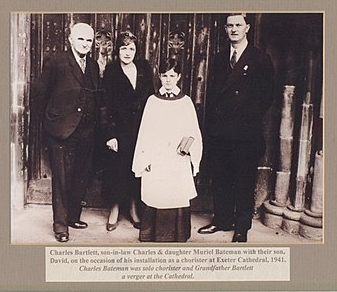| Exeter Cathedral Old Choristers' Association |
Stories and Anecdotes about the choir |
ECOCA > Stories | ||
Add your stories or comment on these - send to Mike Dobson
David Bateman (treble 1941-42) |
I had been sent to the school to avoid the London blitz but did not return after the school was destroyed in May 1942. Thank God for Easter holidays! I last visited Exeter in 1998 and was surprised when talking to one of the virger guides that he did not know where the old school had been. However, the headmaster did. How different the new school is from our days of cold baths (see more comments about cold baths below, and Richard Salter's comments above) and lumpy porridge. [At evensong when I visted] the boy choir were magnificent, though I was a little troubled because the choirmaster stood between decani and cantoris and conducted them. In our day, we took the lead from the decani solo boy and the lead male, a tenor. The choir master played the organ and berated us afterwards if we had not performed to his exacting standards. Our Headmaster, the Rev Langhorne, was a hard taskmaster. Sunken eyes and cheeks, he frightened us junior choristers. But he looked after us, though we didn’t appreciate it at the time! Any misdemeanor meant the headmaster’s study and a beating with the back of his hair brush, trousers down. Matron decided when you needed your hair cut. The barber was at one end of the Close, out of bounds. So, you had to ask the Headmaster for permission to go there. As an innocent probationer you would present yourself to him and say, “Matron says I need a hair cut.” He would take scissors from his desk and cut one hair from your head. Your were supposed to say, “I need my hair cut.” We were all madly in love with his daughter, (Anne, I think) who played the piano when the organ, for some reason or other was out of commission. She died when the school was demolished by the Germans in ’42. There were about thirty or so boys at the school, all probationers or choristers. Regime was harsh: up at 6.30, plunge into a cold bath, winter and summer, breakfast, an hours prep, then choir practice before matins. Lessons after that. Another choir practice before evensong and then more lessons. As well as the three R’s we learnt Latin, French and music theory as well as the piano! I was eight when introduced to this regime. We sang matins and evensong every day except Wednesday (matins only) and Saturday. Sunday there was a sung Eucharist too. We had to stay for all the Christmas services but were rewarded with a slap-up lunch at Dellars restaurant (destroyed in the raid). Likewise Easter. But we all survived! All boarding schools in those days had their initiation ceremonies for new boys. There were two at the choristers’ school that I recall.
Solo boys. In my day, there were two, decani and cantoris. One was the ‘senior chorister’, i.e ‘head boy’. Refrains like Oh for the Wings of a Dove and Hear my Prayer and others in the Messiah etc. were always sung by the solo boys --- who sings them now? I remember we had a solo boy called Dare who even we boys thought sang like an angel! Oh well, times change and I wouldn’t wish on today’s choristers what we had to put up with --- not that it did us any harm! (David emigrated to New Zealand in 1968) |
